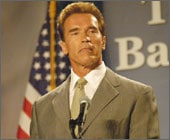California governor Arnold Schwarzenegger said he will tell regulators to require the state’s petroleum refiners and gasoline sellers to reduce greenhouse-gas emissions by 10 per cent and to have the cuts completed by 2020.
The order is one of the first examples of a state or national government regulating fuel in passenger vehicles as part of a strategy not only to reduce emissions that contribute to climate change but also dependence on foreign oil, according to The New York Times.
“Our country has been dependent on foreign oil for too long,” Schwarzenegger said. “I ask you to set to motion the means to free ourselves from oil and from OPEC. I ask you to encourage the free market to overthrow the old order. California has the muscle to bring about such change. I say use it.”
Subscribe to our newsletter
Stay up to date with DeSmog news and alerts







